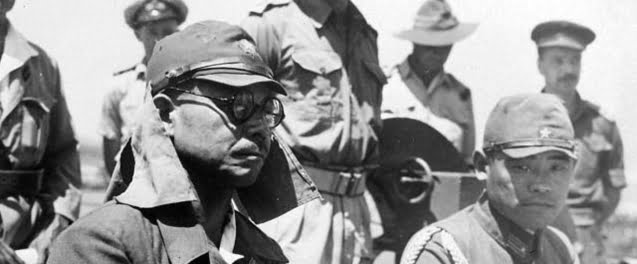
Hideki had an education typical of Japanese youth in the Meiji era. Tojo's father was a samurai turned Army officer and his mother was the daughter of a Buddhist priest, making his family very respectable, but poor.

The Tojo family came from the samurai caste, though the Tojos were relatively lowly warrior retainers for the great daimyōs (lords) that they had served for generations.

After the Meiji Restoration, the caste system was abolished in 1871, but the former caste distinctions in many ways persisted afterwards, ensuring that those from the former samurai caste continued to enjoy their traditional prestige. Under the bakufu, Japanese society was divided rigidly into four castes the merchants, artisans, peasants, and the samurai. Hideki Tojo was born in the Kōjimachi district of Tokyo on December 30, 1884, as the third son of Hidenori Tojo, a lieutenant general in the Imperial Japanese Army. To this day, Tojo's complicity in atrocities such as the Rape of Nanjing, the Bataan Death March, and human experimentation entailing the torture and death of thousands have firmly intertwined his legacy with the fanatical brutality shown by the Japanese Empire throughout World War II. Following his nation's surrender to the Allied Powers in September 1945, he was arrested, convicted by the International Military Tribunal for the Far East in the Tokyo Trials, sentenced to death, and hanged on December 23, 1948. Īfter the war's tide decisively turned against Japan, Tojo was forced to resign as prime minister in July 1944. He was also involved in the sexual enslavement of thousands of mostly Korean women and girls for Japanese soldiers, an event that still strains modern Japanese-Korean relations. During the course of the war, Tojo presided over numerous war crimes, including the massacre and starvation of civilians and prisoners of war. Upon being appointed prime minister on October 17, 1941, he oversaw the Empire of Japan's decision to go to war as well as its ensuing conquest of much of Southeast Asia and the Pacific Islands. On the eve of the Second World War's expansion into Asia and the Pacific, Tojo was an outspoken advocate for a preemptive attack on the United States and its European allies. By July 1940, he was appointed minister of war to the Japanese government led by Prime Minister Fumimaro Konoe. In March 1937, he was promoted to chief of staff of the Kwantung Army whereby he led military operations against the Chinese in Inner Mongolia and the Chahar-Suiyan provinces. He began his career in the Army in 1902 and steadily rose through the ranks to become a general by 1934.

Hideki Tojo was born on December 30, 1884, to a relatively low-ranking samurai family in the Kōjimachi district of Tokyo. During his years in power, his leadership was marked by extreme state-perpetrated violence in the name of Japanese ultranationalism, much of which he was personally involved in. He assumed several more positions including chief of staff of the Imperial Army before ultimately being removed from office in July 1944. info), December 30, 1884 – December 23, 1948) was a Japanese politician, general of the Imperial Japanese Army (IJA), and convicted war criminal who served as prime minister of Japan and president of the Imperial Rule Assistance Association for most of World War II.


 0 kommentar(er)
0 kommentar(er)
